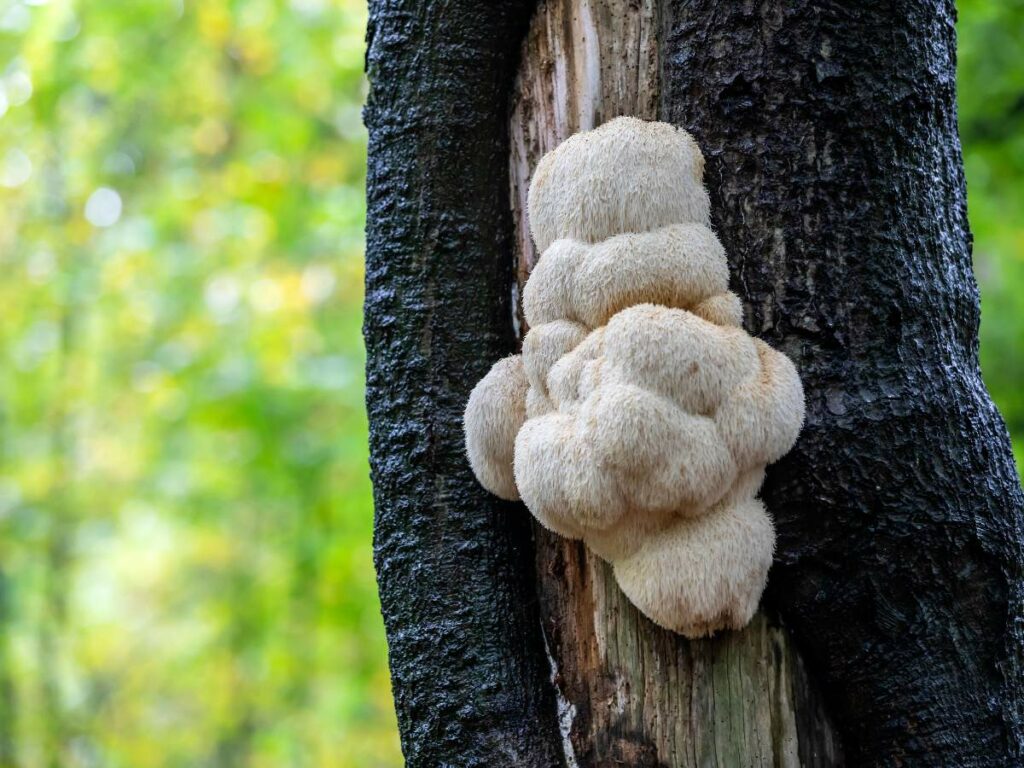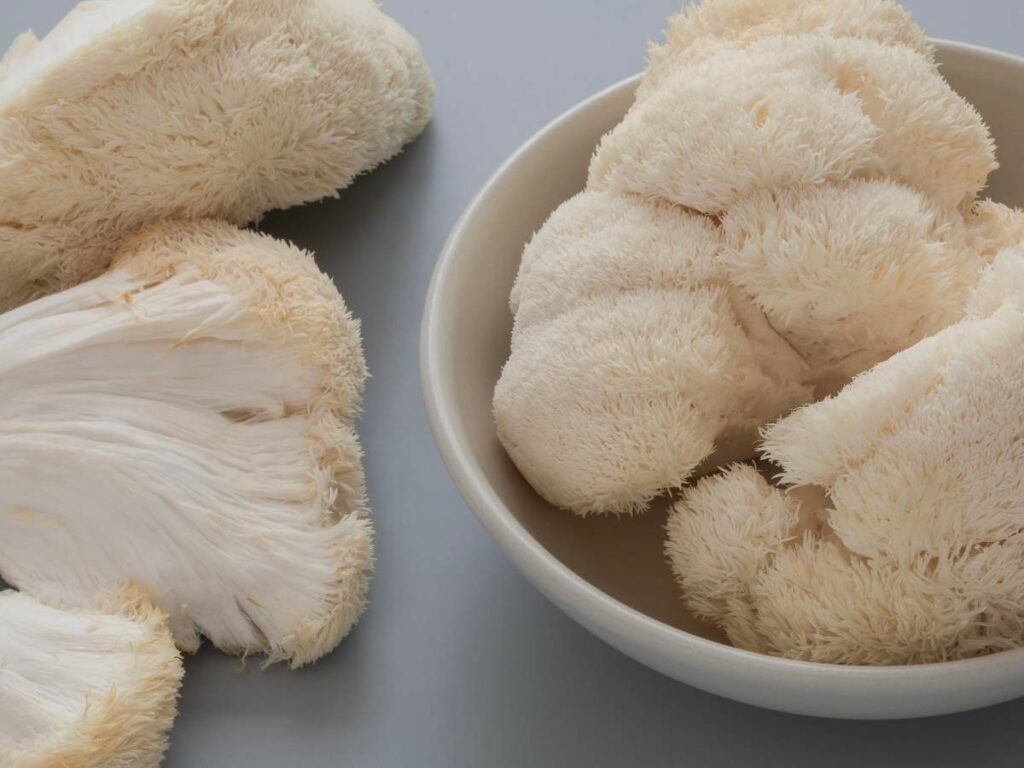Lion’s Mane Benefits: Super Fungi Secrets
Primal Edge Health participates in the Amazon Services LLC Associates Program and other affiliate programs and therefore, may collect a share of sales or other compensation from the links on this page. This comes at no additional cost to you, and all the prices and availability are accurate at the time of publishing.
Lion’s mane benefits are as plentiful as the mushroom itself is unique in appearance and qualities. This powerful, editable fungus boasts numerous mental and physical health benefits that deserve to be explored.

Also known as Hericium erinaceus, the lion’s mane mushroom has gained popularity in recent years due to its potential positive health effects. Native to Asia, America and Europe, this unique fungus has a long history of traditional use in Chinese medicine and is increasingly seen as a valuable functional food in more modern times, as well as in Western culture.
I remember the first time I tried lion’s mane tea—its earthy flavor was unlike anything I’d ever had, and I couldn’t believe how focused and energized I felt afterward. Whether you’re curious about improving cognitive function, boosting immunity, or simply exploring nature’s wonders, lion’s mane might just surprise you. Let’s dive deeper into the incredible benefits this super fungus has to offer.
Table of Contents (click to view)
Lion’s mane introduction
Lion’s mane is easily recognizable thanks to its distinct appearance, resembling the shaggy mane of a lion. It is white with a large shaggy head that resembles the mane of a lion. Its lesser-known name is monkey’s head and is commonly found on decomposing trees.
Lion’s mane is not only edible but also considered a functional mushroom, meaning it offers more than just pleasing taste buds with its beneficial compounds. It is important to know how to clean mushrooms before ingesting them.
Lion’s mane mushroom is native to regions in Asia, North America and Europe, where it grows naturally on hardwood trees, particularly beech and oak. In the US, it is commonly found in powder or supplement form and can be quite difficult to find fresh in stores.
If you are lucky enough to be able to enjoy the actual mushroom, you will certainly enjoy its slightly sweet, yet savory flavor. Some even suggest that it has texture and qualities like seafood.
Lion’s mane benefits
One of the most well-known lion’s mane benefits is its potential to support brain health. It contains bioactive compounds that may help stimulate the growth and regeneration of nerve cells, which could have profound applications in diseases like Alzheimer’s. Beyond cognitive improvements, lion’s mane has also been linked to immune system support, digestive health and anti-inflammatory properties.
“I started dabbling in functional mushrooms a few years ago purely out of curiosity, but it wasn’t until this past year and battling chronic Lyme disease that I truly experienced their benefits. I’ve found cordyceps, reishi and lion’s mane to be incredibly immune supportive and have felt much improved since incorporating them into my healing plan.”
— Gina Matsoukas, Running to the Kitchen
Cognitive enhancements
Another of the lion’s mane benefits include its potential to improve cognitive function and mental health. Bioactive compounds such as hericenones and erinacines found in lion’s mane can stimulate the growth and development of brain cells.
Research indicates that consuming lion’s mane may help prevent conditions like dementia and Alzheimer’s, while also offering neuroprotective properties to assist in the prevention of memory loss and enhance brain function.

Nervous system support
Another of the many lion’s mane benefits is its support for the nervous system. Its ability to enhance peripheral nerve regeneration and general nerve health puts it in a unique position to be used for those suffering from nerve-related disorders or recovering from nerve damage.
According to Behavioural Neurology, lion’s mane contains compounds like hericenones and erinacines, which are thought to stimulate nerve growth factor (NGF) production. This supports nerve cell regeneration and repair, making it potentially beneficial for conditions like neuropathy, multiple sclerosis, or even general age-related cognitive decline. Additionally, its anti-inflammatory properties help reduce nerve inflammation, which further aids the healing process and promotes overall nervous system health.
Potential anti-cancer properties
Lion’s mane mushroom is not only known for its cognitive and neurological benefits but also its potential as an anti-cancer agent. Studies suggest that lion’s mane may possess antioxidant properties that could help combat cancer.
As in many cases, more research is needed to confirm this exciting potential. Nonetheless, lion’s mane is promising for individuals seeking additional support during their cancer journey with the addition of these beneficial mushrooms.
Inflammation
Inflammation is a crucial part of the body’s healing process, serving as a natural response. Short-term inflammation, also known as acute inflammation, is generally beneficial and serves a productive purpose. However, when inflammation becomes chronic and persists over the long term, it can lead to various issues.
Common causes of inflammation include toxins, obesity, stress and lifestyle choices among others. Chronic inflammation has been closely linked to conditions such as cardiovascular disease and cancer. Research has demonstrated that lion’s mane possesses anti-inflammatory properties, particularly targeting adipose tissue inflammation which is commonly associated with obesity.
Depression and anxiety
Lion’s mane mushroom can assist in the management of symptoms of anxiety and depression. An astounding 21 million Americans have experienced severe depression which equates to 8.3 percent of the population. Additionally, it is estimated that almost 20 percent of Americans experience anxiety disorders. In 2022 it was reported that a 25 percent increase was seen in anxiety and depression.
Lion’s mane has been shown to have anti-inflammatory properties that can directly reduce anxiety and depression symptoms. Additionally, it can improve the functioning of the hippocampus. This is important as it is the region of our brain that processes emotional responses and memory.
Finally, a group of menopausal women received a daily cookie infused with lion’s mane. After 4 weeks, they reported a decrease in anxiety, depression and irritability. The intriguing question arises: Was it the cookie or the lion’s mane that contributed to these positive results? Research strongly indicates that lion’s mane played a significant role.
Considerations: Lion’s mane mushroom side effects
While discussing the many lion’s mane benefits, it is also important to further investigate potential side effects. Experiments to date have shown Lion’s mane mushrooms to be safe. However, it is essential to be aware of its recommended dosage and possible side effects such as GI discomfort, dizziness and skin rashes.
For some individuals, particularly those with sensitivities or allergies to mushrooms, consuming lion’s mane may lead to digestive issues like stomach upset, bloating or diarrhea, according to LiverTox. If you are trying lion’s mane for the first time, it’s wise to start with a lower dosage and monitor your body’s reaction to ensure there are no adverse effects.
Allergic reactions, though rare, are another possible side effect. Symptoms might include itchy skin, rashes, or difficulty breathing. If you experience any of these symptoms after consuming lion’s mane, discontinue use immediately and consult a healthcare professional.

Integrating lion’s mane into the diet
To take advantage of the many lion’s mane benefits, there are several ways to incorporate it into a healthy diet. The two most popular forms are the use of supplements and consuming the fresh mushroom.
Supplementation
Lion’s mane is widely available in various supplement forms, such as capsules and tablets. The dosage recommended for each form may differ, so it is crucial to consult a healthcare provider before starting consumption of the supplement. Supplements are particularly convenient for those who want to include lion’s mane regularly but may not have access to fresh mushrooms.
Lion’s mane powder is a versatile option that can be added to different foods and drinks, such as this chocolate protein mud drink or this copycat homemade MudWtr powder. It makes a perfect gift for coffee lovers as they can mix it up with a few other mushroom powders and use it to replace coffee creamer or coffee syrup. You could also blend lion’s mane powder into an ashwagandha coffee, bone broth latte, smoothies, or soups for a nutritional boost.
Fresh mushroom
Lion’s mane mushrooms can also be added directly to your regular meals from meat pie to Alice Spring’s chicken or used as a powder to enhance the nutritional value of food and beverages. Fresh lion’s mane mushrooms can be found at some grocery stores and farmers’ markets. They are not very popular, however, so they can be hard to find.
Fresh lion’s mane mushrooms can simply be sliced, spiced, sauteed and eaten. Their texture has been compared to seafood like crab or lobster, making them a fantastic meat substitute for vegetarian dishes. You can try adding lion’s mane to stir-fries, soups, pasta dishes or even battering and frying it for a crispy snack. If you really want a treat, be sure to take some time and check out how to cook lion’s mane mushrooms.
For those who enjoy experimenting in the kitchen, lion’s mane can even be transformed into a “crab cake” due to its flaky, tender texture. Just mix with breadcrumbs, egg, and your favorite seasonings, and pan-fry for a plant-based take on this classic dish.
Lion’s mane tea
Another popular way to enjoy lion’s mane is by making it into tea. Lion’s mane tea can be brewed from dried mushrooms or from lion’s mane powder. There are also many commercially available lion’s mane teas.
This tea is known for its earthy flavor and can be easily mixed with honey, lemon or other herbs for added taste. Drinking lion’s mane tea regularly is a soothing way to support cognitive health and boost the immune system, while also providing the many benefits lion’s mane has to offer. It’s one of my favorite alternatives to coffee!
Lion’s Mane benefits final thoughts
Among the numerous lion’s mane benefits, some of the key advantages include its ability to support brain health, promote a healthy nervous system and potentially combat cancer. While it is generally considered safe for consumption, individuals should be mindful of dosage recommendations and possible side effects.
Incorporating lion’s mane into a healthy diet can be achieved through supplementation or utilizing fresh mushrooms in various culinary creations. Make sure to consult your primary care provider before adding lion’s mane or any other fungi to your diet.
Portions of this article originally appeared on Food Drink Life.







